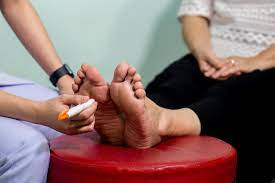Definisi
Neuropati diabetikum merupakan komplikasi penyakit diabetes berupa kerusakan saraf. Jika kerusakan saraf terjadi pada banyak saraf, maka disebut polineuropati. Gula darah yang tinggi dapat melukai saraf di seluruh tubuh. Neuropati diabetikum paling sering merusak saraf di kaki. Bergantung pada saraf yang terkena, gejala neuropati diabetikum bervariasi dari rasa nyeri dan mati rasa di kaki, hingga masalah pada sistem pencernaan, saluran kemih, pembuluh darah, dan jantung. Beberapa orang dapat memiliki gejala ringan. Namun, ada juga yang terasa sangat menyakitkan dan menimbulkan keterbatasan aktivitas.
Neuropati diabetikum adalah komplikasi serius dari diabetes yang dapat mempengaruhi sekitar 50% penderita diabetes. Kondisi ini dapat dicegah atau diperlambat dengan pengelolaan gula darah yang baik disertai gaya hidup sehat.
Penyebab
Penyebab pasti dari setiap jenis neuropati belum diketahui. Namun, para peneliti telah mempelajari bahwa seiring waktu, gula darah tinggi yang tidak terkontrol dapat merusak saraf dan mengganggu fungsinya. Gula darah tinggi juga akan melemahkan dinding pembuluh darah kecil (kapiler) yang memasok oksigen dan nutrisi ke saraf. Kondisi ini berkaitan dengan timbulnya neuropati diabetikum.
Faktor Risiko
Siapapun yang menderita diabetes berpeluang mengalami neuropati. Namun, faktor-faktor risiko berikut membuat pasien lebih berisiko mengalami kerusakan saraf:
- Kontrol gula darah yang buruk. Gula darah yang tidak terkontrol membuat Anda lebih berisiko mengalami setiap komplikasi dari diabetes, termasuk kerusakan saraf.
- Riwayat diabetes. Risiko neuropati diabetes akan meningkat semakin lama Anda menderita diabetes, terutama jika gula darah tidak terkontrol dengan baik.
- Penyakit ginjal. Diabetes dapat merusak ginjal. Kerusakan ginjal mengakibatkan racun tidak tersaring dan mengalir lagi di dalam darah. Racun di dalam darah ini dapat menyebabkan kerusakan saraf.
- Kelebihan berat badan. Orang dengan obesitas lebih berisiko terkena neuropati diabetikum.
- Merokok. Merokok akan mempersempit dan memperkeras dinding pembuluh arteri dan mengurangi aliran darah ke kaki, sehingga membuat luka sulit sembuh dan merusak saraf tepi kaki.
Gejala
Ada tiga jenis utama neuropati diabetikum. Pasien dapat memiliki satu atau lebih jenis neuropati. Gejala tergantung pada jenis neuropati dan saraf mana yang terpengaruh. Biasanya, gejala berkembang secara bertahap. Pasien mungkin tidak memiliki keluhan sampai kerusakan saraf cukup parah.
Neuropati Perifer
Jenis neuropati ini juga dapat disebut neuropati perifer simetris distal. Ini adalah jenis neuropati diabetes yang paling umum. Kondisi ini pertama-tama akan memengaruhi kaki dan tungkai, lalu diikuti oleh tangan dan lengan. Tanda dan gejala neuropati perifer, meliputi:
- Mati rasa atau berkurangnya kemampuan merasakan nyeri atau perubahan suhu.
- Sensasi kesemutan atau terbakar.
- Nyeri tajam atau kram.
- Peningkatan kepekaan terhadap sentuhan bagi sebagian orang, bahkan kaki yang terkena selimut bisa terasa nyeri.
- Masalah kaki yang serius, seperti ulkus, infeksi, serta nyeri tulang dan sendi.
- Gejala seringkali memberat di malam hari.
Neuropati otonom
Sistem saraf otonom mengontrol jantung, kandung kemih, lambung, usus, organ reproduksi, dan mata. Diabetes dapat memengaruhi saraf di salah satu area ini, sehingga menyebabkan hal-hal berikut ini:
- Kadar gula darah rendah (hipoglikemia) yang tidak disadari sehingga menimbulkan keluhan.
- Masalah kandung kemih atau pencernaan.
- Pengosongan lambung yang lambat (gastroparesis) sehingga menyebabkan mual, muntah, dan penurunan nafsu makan.
- Gangguan penyesuaian penglihatan dari cahaya terang ke gelap
- Respon seksual menurun.
Neuropati Proksimal (poliradikulopati diabetik)
Jenis neuropati ini juga disebut amiotrofi diabetik. Kondisi ini sering mengenai saraf di paha, pinggul, bokong, atau kaki. Gangguan saraf ini juga dapat memengaruhi daerah perut dan dada. Gejala biasanya pada satu sisi tubuh, tetapi dapat menyebar ke sisi lain. Gejala yang dirasakan antara lain:
- Nyeri hebat di pinggul, paha, atau bokong
- Pada akhirnya otot paha dapat menjadi lemah dan mengecil
- Kesulitan berdiri dari posisi duduk
- Nyeri perut hebat
Diagnosis
Dokter mendiagnosis neuropati diabetikum melalui pemeriksaan fisik dan meninjau gejala serta riwayat kesehatan pasien. Dokter akan memeriksa:
- Kekuatan dan tonus otot
- Refleks tendon
- Kepekaan terhadap sentuhan dan getaran
Dokter juga dapat melakukan tes khusus untuk membantu mendiagnosis neuropati diabetikum, seperti:
- Tes filamen. Dokter akan menyikat kulit Anda dengan lembut menggunakan serat nilon halus (monofilamen) untuk menguji kepekaan Anda terhadap sentuhan.
- Tes sensorik. Tes non-invasif ini digunakan untuk mengetahui respons saraf terhadap getaran dan perubahan suhu.
- Tes konduksi saraf. Tes ini mengukur seberapa cepat saraf di lengan dan kaki menghantarkan sinyal listrik.
- Tes respons otot atau elektromiografi. Tes ini sering dilakukan bersamaan dengan tes konduksi saraf. Tes ini mengukur aktivitas listrik yang dihasilkan otot Anda.
- Tes otonom. Tes khusus dapat dilakukan untuk menentukan bagaimana tekanan darah Anda berubah saat berada di posisi yang berbeda, dan apakah Anda berkeringat dengan normal.
Tata Laksana
Penatalaksanaan polineuropati diabetikum bertujuan untuk memperlambat perkembangan penyakit, meredakan nyeri, serta mengatasi komplikasi dan mengembalikan fungsi. Hingga saat ini, kondisi polineuropati diabetikum belum dapat disembuhkan secara total. Namun, dengan pengobatan yang rutin dan tepat, kualitas hidup orang dengan polineuropati diabetikum dapat meningkat.
Memperlambat Perkembangan Penyakit
Menjaga gula darah secara konsisten adalah kunci mencegah atau menunda kerusakan saraf. Manajemen gula darah yang baik bahkan dapat memperbaiki beberapa gejala. Dokter akan menentukan kisaran target terbaik bagi gula darah Anda berdasarkan beberapa faktor termasuk usia, lama menderita diabetes, dan kesehatan Anda secara keseluruhan.
Cara lainnya yang tidak kalah penting untuk memperlambat atau mencegah neuropati memburuk adalah menjaga tekanan darah tetap normal, menjaga berat badan ideal, dan melakukan aktivitas fisik secara teratur.
Menghilangkan Rasa Sakit
Banyak obat yang tersedia untuk nyeri saraf karena diabetes. Namun, obat tersebut tidak sama untuk setiap orang. Saat memilih obat apa pun, konsultasikan dahulu dengan dokter mengenai obat yang paling cocok untuk Anda. Dokter dapat merekomendasikan obat antikejang atau antidepresan untuk meredakan nyeri saraf. Selain itu, obat seperti acetaminophen, ibuprofen, atau koyo berisi obat mati rasa dosis rendah juga bermanfaat untuk membantu mengatasi nyeri.
Mengatasi Komplikasi dan Mengembalikan Fungsi
Untuk mengatasi komplikasi, Anda mungkin memerlukan perawatan oleh beberapa spesialis berbeda, seperti dokter spesialis saluran kemih/urologi dan dokter jantung. Pengobatan yang Anda butuhkan tergantung pada komplikasi yang terjadi:
- Masalah saluran kemih. Dokter akan menyarankan untuk menghentikan atau mengganti obat yang berpengaruh ke saluran kemih. Buang air kecil setiap beberapa jam sambil memberikan tekanan lembut ke area kandung kemih (di bawah pusar Anda) dapat membantu beberapa masalah kandung kemih. Metode lain seperti pemasangan kateter urin mungkin diperlukan.
- Masalah pencernaan. Untuk meringankan gejala gastroparesis ringan, gangguan pencernaan, sendawa, mual atau muntah, dokter dapat menyarankan untuk makan dalam porsi kecil namun lebih sering. Perubahan pola makan dan obat-obatan dapat membantu meringankan gastroparesis, diare, konstipasi, dan mual.
- Tekanan darah rendah saat berdiri dari duduk atau baring (hipotensi ortostatik). Pengobatan dimulai dengan perubahan gaya hidup sederhana, seperti menghindari alkohol, minum banyak air, dan mengubah posisi secara perlahan. Tidur dengan menaikkan kepala sekitar 6 hingga 10 inci dapat membantu mencegah perubahan tekanan darah.
- Disfungsi seksual. Obat-obatan minum atau suntikkan dapat meningkatkan fungsi seksual pada beberapa pria, tetapi tidak aman dan efektif untuk semua orang. Sementara wanita dapat merasa lebih baik dengan pelumas vagina.
Beberapa langkah lain seperti menjaga tekanan darah tetap terkendali, konsumsi makanan sehat, berhenti merokok, serta melakukan aktivitas fisik rutin juga dapat membantu mencegah komplikasi lebih lanjut.
Konsultasi dengan dokter atau ahli terapi fisik sebelum Anda mulai berolahraga. Jika Anda mengalami penurunan rasa di kaki Anda, beberapa jenis olahraga seperti berjalan, mungkin lebih aman dibanding olahraga lainnya. Jika Anda mengalami cedera atau sakit pada kaki, tetap lakukan olahraga yang tidak membebani kaki yang cedera
Pasien dengan neuropati diabetik dapat mengalami kesulitan dalam melakukan aktivitas sehari-hari dan rentan mengalami stres. Jika Anda merasa terganggu dengan rasa nyeri yang timbul, Anda juga dapat berkonsultasi dengan psikoterapis untuk mengurangi kecemasan Anda. Kelompok pendukung juga dapat memberi dukungan dan saran mengenai cara hidup dengan neuropati diabetik.
Komplikasi
Neuropati diabetik dapat menyebabkan sejumlah komplikasi serius, seperti:
- Hipoglikemia yang tidak disadari. Hipoglikemia atau kadar gula darah yang rendah ditandai dengan nilai gula darah di bawah 70 mg/dl.
- Kehilangan jari kaki, kaki, atau tungkai. Kerusakan saraf dapat membuat mati rasa pada kaki, sehingga luka kecil dapat meluas tanpa Anda sadari.
- Infeksi saluran kemih dan inkontinensia urin (tidak dapat menahan BAK). Jika saraf yang mengontrol kandung kemih mengalami kerusakan, Anda mungkin tidak dapat mengosongkan kandung kemih sepenuhnya. Bakteri dapat menumpuk di kandung kemih dan ginjal sehingga menyebabkan infeksi saluran kemih. Kerusakan saraf juga dapat mempengaruhi kemampuan Anda untuk merasakan tanda ingin BAK atau untuk mengontrol otot-otot yang mengeluarkan urin. Hal ini menyebabkan inkontinensia urin.
- Penurunan yang tajam pada tekanan darah. Kerusakan pada saraf yang mengontrol aliran darah dapat mempengaruhi kemampuan tubuh untuk menyesuaikan tekanan darah.
- Masalah pencernaan. Jika kerusakan saraf mengenai saluran pencernaan, Anda bisa mengalami sembelit atau diare. Kerusakan saraf terkait diabetes dapat menyebabkan gastroparesis, yaitu pengosongan lambung melambat sehingga menyebabkan kembung dan gangguan pencernaan.
- Disfungsi seksual. Pria dapat mengalami disfungsi ereksi. Sementara wanita dapat mengalami gangguan pada gairah dan produksi cairan pelumas.
- Keringat berlebih atau berkurang. Kerusakan saraf dapat mengganggu kerja kelenjar keringat dan mempersulit tubuh mengontrol suhu.
Pencegahan
Anda dapat mencegah atau menunda neuropati diabetikum dan komplikasinya dengan mengontrol gula darah secara cermat dan merawat kaki Anda dengan baik.
Manajemen Gula Darah
Asosiasi Diabetes Amerika merekomendasikan agar penderita diabetes melakukan tes HbA1C, yaitu gula yang melekat pada sel darah merah, minimal dua kali setahun. Tes ini dapat menunjukkan kadar gula darah rata-rata Anda selama 2-3 bulan terakhir. Jika kadar gula darah melebihi target, pasien perlu melakukan penyesuaian pola makan maupun dosis obat.
Perawatan Kaki
Ikuti saran dokter Anda mengenai perawatan kaki yang baik. Beberapa langkah untuk menjaga kesehatan kaki Anda antara lain:
- Periksa kaki setiap hari. Periksa apakah terdapat bisul, luka, memar, kulit pecah-pecah dan mengelupas, kemerahan, atau bengkak. Gunakan cermin atau minta tolong orang lain untuk membantu memeriksa bagian yang sulit dilihat.
- Jaga kaki agar tetap bersih dan kering. Cuci kaki setiap hari dengan air hangat dan sabun lembut. Hindari merendam kaki. Keringkan kaki dan sela-sela jari kaki dengan hati-hati.
- Jaga kelembaban kaki agar terhindar dari kulit pecah-pecah. Namun, jangan gunakan lotion di antara jari-jari kaki karena dapat memicu pertumbuhan jamur.
- Potong kuku kaki dengan hati-hati. Potong kuku kaki dengan arah lurus. Kikir tepinya dengan hati-hati agar bagian tepi kuku tidak tajam.
- Kenakan kaus kaki yang bersih dan kering. Cari kaus kaki yang terbuat dari katun atau bahan yang menyerap keringat serta tidak memiliki pita ketat atau jahitan tebal
- Kenakan sepatu empuk yang pas. Selalu kenakan sepatu atau sandal untuk melindungi kaki. Pastikan sepatu Anda pas di kaki dan memiliki ruang untuk jari-jari kaki Anda bergerak. Dokter ahli kaki diabetik dapat memberi saran mengenai cara membeli sepatu yang pas dan mencegah masalah kaki seperti kapalan.
Skrining gangguan saraf juga dapat dilakukan untuk mencegah komplikasi neuropati diabetikum. Asosiasi Diabetes Amerika merekomendasikan agar skrining neuropati diabetes dimulai segera setelah seseorang didiagnosis menderita diabetes tipe 2, dan lima tahun setelah seseorang didiagnosis diabetes tipe I. Setelah itu, skrining dianjurkan dilakukan setiap tahun.
Kapan Harus ke Dokter?
Konsultasi dengan dokter jika Anda memiliki:
- Luka pada kaki yang mengalami infeksi atau tidak kunjung sembuh.
- Rasa terbakar, kesemutan, lemas, atau nyeri pada tangan atau kaki yang mengganggu aktivitas sehari-hari dan mengganggu tidur.
- Keluhan pada pencernaan, buang air kecil, atau fungsi seksual.
- Pusing dan pingsan.
Mau tahu informasi seputar penyakit lainnya? Cek di sini, ya!
- dr Ayu Munawaroh, MKK
Diabetic neuropathy. (2020). Retrieved 7 Desember 2021, from https://www.mayoclinic.org/diseases-conditions/diabetic-neuropathy/symptoms-causes/syc-20371580
Quan D. (2021). Diabetic neuropathy. Retrieved 7 Desember 2021, from https://emedicine.medscape.com/article/1170337-overview
Feldman EL. (2020). Pathogenesis of diabetic polyneuropathy. Retrieved 11 Desember 2021, from https://www.uptodate.com/contents/pathogenesis-of-diabetic-polyneuropathy#H185172517
Diabetic neuropathy. (2021). Retrieved 7 Desember 2021, from https://www.hopkinsmedicine.org/health/conditions-and-diseases/diabetes/diabetic-neuropathy-nerve-problems
Diabetic polyneuropathy. (2021). Retrieved 11 Desember 2021, from https://www.pijn.com/en/diabetic-polyneuropathy.












